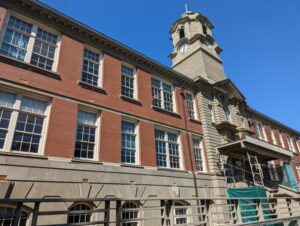On Saturday, October 15, voting stations will open to the public for the 2022 municipal elections. This election is the time for the public to vote on matters important to them and make a difference in issues affecting individuals and groups locally. One large group of voters greatly affected by current issues, such as housing, are students.
Camosun College Student Society (CCSS) external executive Jessie Niikoi says that it’s important that students vote in the municipal elections now more than ever, with the current housing crisis being so out of control.
“I do think it’s very important that students vote in the upcoming elections because most of the things that are affecting students right now are run by the municipality,” says Niikoi. “So, things like housing… I always feel like it’s important for students to know that they get to decide which people are going to be running these things for the next number of years.”

The municipality also influences public transportation, which many students rely on daily. Camosun College Political Science instructor Daniel Reeve explains that while the province provides money for public transportation, the municipality does the work organizing and making decisions about the bus system.
“The province provides money but it’s the municipality that does the work organizing and deciding how much the fees should be, the routes, how often… So, again, the municipality will decide for a lot of students how quickly and how often a bus could come to take them to school,” says Reeve.
The CCSS strives to encourage students to vote in elections by hosting events such as political engagement fairs and sharing campaign material on campus.
“We definitely want good people to run our municipality, so we do have a political engagement fair [that happened] on the fourth and the fifth of October, so we just opened it up to all the candidates to come in and speak about what they have to offer them,” says Niikoi. “And because we are also members of the BCFS [British Columbia Federation of Students], we also receive campaign material from them because they’re also helping us get out there and let people know that they have to vote in these [elections].”
Municipal elections historically have a much smaller voter turnout than provincial or federal elections; this allows voters to have a larger impact on their community. Not only do these smaller elections allow each vote to have a more direct influence on issues but it also gives people the opportunity to connect with their local councillors, explains Reeve.
“The number of people who vote in this election is much smaller, typically 25 to 35 percent of the potential voters do vote,” says Reeve. “Your vote has more resonance. You select more candidates… And because there are fewer votes, your vote has more influence than, say, a provincial or federal election. And once people are elected, you can meet with your local councillors. Most of them are not professional politicians, that’s their part-time job, and their job is to reach out to their communities. You just have greater access.”
Statistically, students and younger age groups have a low voter turnout rate, so Reeve recommends voting as soon as possible to get into the habit of it. He advises people to try to not be overwhelmed with municipal politics and to take it slow.
“Voting is a habit, and the earlier you get into the habit, the more likely you are to continue,” says Reeve. “It’s almost like training wheels. Take a couple of candidates you feel confident about and who support the type of values you have and vote for them. Don’t worry about the rest. Then maybe next time, you can pick a couple of more. It can be a starting point towards one of our democratic responsibilities, which is to have our voices heard.”
